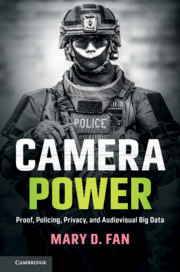Book contents
- Camera Power
- Camera Power
- Copyright page
- Dedication
- Contents
- Figures
- Tables
- Acknowledgments
- Introduction
- Part I Toutveillance Power and Police Control
- 1 Policing in the Camera Cultural Revolution
- 2 Copwatching and the Right to Record
- 3 Democratizing Proof, Taking the Case to the People
- Part II Audiovisual Big Data’s Great Potential and Perils
- Part III Frameworks for Moving Forward
- Appendix The Collection and Coding of 213 Body Camera Policies
- Index
2 - Copwatching and the Right to Record
from Part I - Toutveillance Power and Police Control
Published online by Cambridge University Press: 03 May 2019
- Camera Power
- Camera Power
- Copyright page
- Dedication
- Contents
- Figures
- Tables
- Acknowledgments
- Introduction
- Part I Toutveillance Power and Police Control
- 1 Policing in the Camera Cultural Revolution
- 2 Copwatching and the Right to Record
- 3 Democratizing Proof, Taking the Case to the People
- Part II Audiovisual Big Data’s Great Potential and Perils
- Part III Frameworks for Moving Forward
- Appendix The Collection and Coding of 213 Body Camera Policies
- Index
Summary
- Type
- Chapter
- Information
- Camera PowerProof, Policing, Privacy, and Audiovisual Big Data, pp. 59 - 81Publisher: Cambridge University PressPrint publication year: 2019



